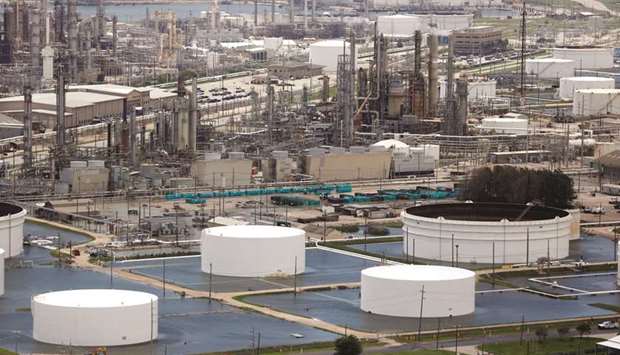Hard-to-travel roads are still making it tough to deliver sand, a key component in fracking, said chief executive officer Bill Thomas of EOG Resources Inc, whose Eagle Ford operations sit about 100 miles inland from Harvey’s landfall. And some mines are withholding shipping so their rail cars aren’t stuck waiting for frack crews to return to work, according to Joseph Triepke, founder of InfillThinking.com, an oilfield research firm.
“The rail cars are a big investment,” Triepke said by telephone on Thursday. “They don’t want those assets just sitting there underutilised because there’s no clarity when a completion might happen.” He estimates the supply chain issues caused by Harvey should all be cleared out in a couple of weeks.
The Eagle Ford shale play, which stretches several hundred miles just south and east of San Antonio, was the only major oilfield to feel the fury of Hurricane Harvey. Overall, as much as 10% of the nation’s frack work was expected to be delayed as a result of the storm, Marshall Adkins, an analyst at Raymond James & Associates Inc, wrote in a note to investors the previous week.
EOG saw its third-quarter volumes cut by about 15,000 bpd, Thomas told analysts and investors on Wednesday at the Barclays CEO Energy Conference in New York. Pioneer Natural Resources Co saw a loss in output of 1,000 bpd to 2,000 bpd, CEO Tim Dove said at the same forum, calling the result “relatively minimal” given the ferocity of the storm.
Devon Energy Corp temporarily ceased drilling, well-completion activity and shut-in production across its entire Eagle Ford position in preparation for Harvey, CEO Dave Hager said in an interview with Bloomberg Television’s Alix Steel on Thursday. The company has now resumed drilling, and expects to have the vast majority of affected production online by end of the week.
The company plans to update its production outlook once more information is available, he said.
Fracking, or hydraulic fracturing, is a well-completion technique that blasts water, sand and chemicals underground to release trapped hydrocarbons within layers of shale. Development of the process has led to a US shale boom that dropped the price of crude oil to less than $30 a barrel at the start of 2016 from more than $100 a barrel previously.
Pioneer, which differs from other explorers by doing a lot of its own oilfield service work in-house, said it’s decision to handle that could give the company an edge against competitors moving forward.
“The need for manpower for the restoration of those areas in South Texas is going to be immense,” Dove said. “We don’t have to compete with people who are otherwise going to be drawn to South Texas or others in an already tight labour market.”
Rainwater from Hurricane Harvey surrounds oil refinery storage tanks in this aerial photograph taken above Texas City on August 30. Overall, as much as 10% of the nation’s frack work was expected to be delayed as a result of the storm, Marshall Adkins, an analyst at Raymond James & Associates Inc, wrote in a note to investors.

